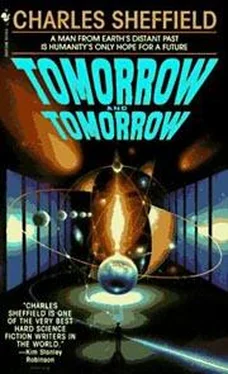Or one new original work by Drake Merlin? Drake wasn’t sure, then or ever. But two months after Ana had been placed in the cryowomb, he appeared in Bonvissuto’s office one morning without warning. The teacher gave him one startled look, then turned his eyes away. “I know, I know,” he said. “I’m terribly sorry.”
It had been three years since the two last met, but Bonvissuto had followed the careers of all his former students. He took vast pride in them. Naturally, he knew about Ana.
“I didn’t come here to talk about her,” Drake said, “unless you want to, I mean. I came to ask your advice.”
“Anything that I can do, I will. For you and little Ana, I will be happy…” Bonvissuto paused, swallowed, and turned away. The volatile Italian persona was not all fake.
“I have to make money.” Drake spoke dispassionately to the other man’s back. He needed advice, not emotional support. “A lot of money. I wondered if you could suggest a way.”
“You! The least commercial of all my students. Oh!” Bonvissuto turned again, and Drake saw in his eyes a sudden understanding. “I know. I went through some of it myself, two years ago. The damned hospitals — the tests, and all the drugs, and prices you wouldn’t believe — five dollars for an aspirin, two hundred dollars a day for a room, fifty dollars for a doctor who drops in on you for two minutes and doesn’t even look at you — they bleed you dry.”
Drake nodded. It was a mistaken assumption, but letting it stand saved lots of explanation. “I need to make as much money as I can. As quickly as I can. I don’t know how.”
“But I do.” Bonvissuto went across to his piano. “Provided you are willing to lower your standards. Are you?”
“I don’t know. What do you mean?”
“Don’t worry. I am not about to suggest that you form a rock group. You compose well, and you compose fast. But your music is too difficult to be popular. This is what Drake Merlin is writing.” Bonvissuto played a sequence of spare chords with no clear tonal center, and above them on the right hand a wandering angular melody.
“That’s from my Suite for Charon !”
“It is indeed. I took the liberty of making a piano transcription.” Bonvissuto sounded not at all apologetic. “It is very beautiful — to you, and me, and maybe a few thousand others. But if you want to appeal to a few million, you must be simpler, more accessible. Like this.” Bonvissuto played a jaunty bass theme, accompanied by dazzling prestissimo downward runs on the right hand.
Drake frowned. “That’s by Danny Elfman. It’s film music.”
“It is. Are you saying you are above such things?”
“Not at all. It’s first-rate. But I can’t walk into a film studio and say, let me score a movie. They’d throw me straight out.”
“Of course.” Bonvissuto shrugged. “It is obvious that you don’t start there. Or rather, if you choose to start there, I can’t help you. But a dozen paths can lead in that direction.” He stood up, went to his old oak desk, and picked up a cheap black notebook with a spiral binder. “All the time, I hear of musical markets. I write them down. They are open to you, provided that you don’t insist on writing compositions that break new ground. People are most comfortable with the familiar. They say they know what they like, but really they like what they know. See here.”
He opened the book and ran down the list of entries with his long, thin index finger. “I include concerts and recitals on this list, but for you I strongly recommend composition. Are you willing to write a commemorative overture for the hundredth anniversary of the first heavier-than-air flight? That offers four thousand dollars, for eleven minutes. The time requirement is precise, no more, no less. The work will be played after the national anthem, after a Star Wars selection and before ‘The Stars and Stripes Forever.’ I would not recommend march tempo. Or how about this one, which came to me through private channels: a commission to ghost-write a violin concerto for a Cabinet member with musical delusions of grandeur.”
“What would I do?”
“You would write the music, after listening for half an hour to Lamar Malory’s vague and off-key humming of themes. Your name will not, of course, go on the finished work. His name will. The fee offered, for your music and your silence, is four hundred dollars per composed minute. It is not much, but the music does not have to be very good. In fact, it would be suspicious if it were.”
Drake bit back the urge to ask why Bonvissuto did not take the commissions himself. “What are the deadlines?”
“How soon can you produce?”
“Faster than anyone else they can find. I’ll take both of them. As many as I can get, in fact. I’ll write around the clock if I have to.”
“I’ll see what I can do. I can’t guarantee these or any other commissions, but I can make sure that you are on the short list. After that it’s up to you. I warn you, you will be dealing with people who have no more music in them than a dog who howls at the moon.” Bonvissuto shrugged. “I am sorry, but that is the price. Never mind. When you have the money that you need, you can return to normal life.”
A normal life was not what Drake had in mind — not for a long time yet. But he could not discuss his plans. He thanked Bonvissuto and left.
It was the beginning of a long period of incessant work. Drake took commissions, wrote commemorative pieces, gave concerts, and made recordings. As his reputation for good, fast, and reliable work grew, he produced reams of music for good, bad, and indifferent shows and movies. If anyone compared his recent work with his earlier work, and thought that he was debasing his art, they were too polite to comment. His own attitude was simple: if it was lucrative, it was acceptable.
Once a month he visited Ana’s cryowomb facility. He could not see her, but he could sit outside the room where she was housed. Knowledge of her presence produced in him a strange tranquillity. After a couple of hours with her, he could again face his work.
Sometimes that work was unpleasant, grinding toil. Since he agreed to tight deadlines, he was often forced to compose late at night when he was close to exhaustion. But sometimes the odd commercial challenges brought out the best in him. The finest melody of his life came to him as the theme music to a successful television show. And after four years he had an even bigger stroke of luck.
He had written a set of short pieces a couple of years after he and Ana first met, a kind of musical joke designed especially to appeal to her. They were baroque forms, with period harmonies, but he had added occasional modern
harmonic twists, piquancy inserted where it would be most surprising and most appealing.
They had been quite successful, although only among a limited audience. Now, given a commission to provide the incidental music for a series of television dramas on life in eighteenth-century France, and facing another impossible delivery date, Drake returned to cannibalize, adapt, and simplify his own earlier work. The dramas turned out to be the hit of the decade. His music was credited as a big part of the reason for their success. Suddenly his minuets, bourrees, gavottes, sarabands, and rondeaux were everywhere. And as they flooded from the audio outlets, the royalties flooded in from every country around the globe.
Drake went on working as hard as ever. He established a foundation and trust fund. It guaranteed continued care for Ana’s cryocorpse for many centuries, no matter what happened to Drake himself.
Freed from a need for money, his work changed direction. Instead of endless composition he became feverishly busy soaking up all that he could learn of the private and personal lives of his musical contemporaries. He interviewed, entertained, courted, and analyzed them, and he wrote about them extensively. But never quite in full. In every piece he was careful to leave a hanging tail, a hint that said, “There is much more to say and I know what it is; but for the moment I am deliberately leaving it unsaid.”
Читать дальше












